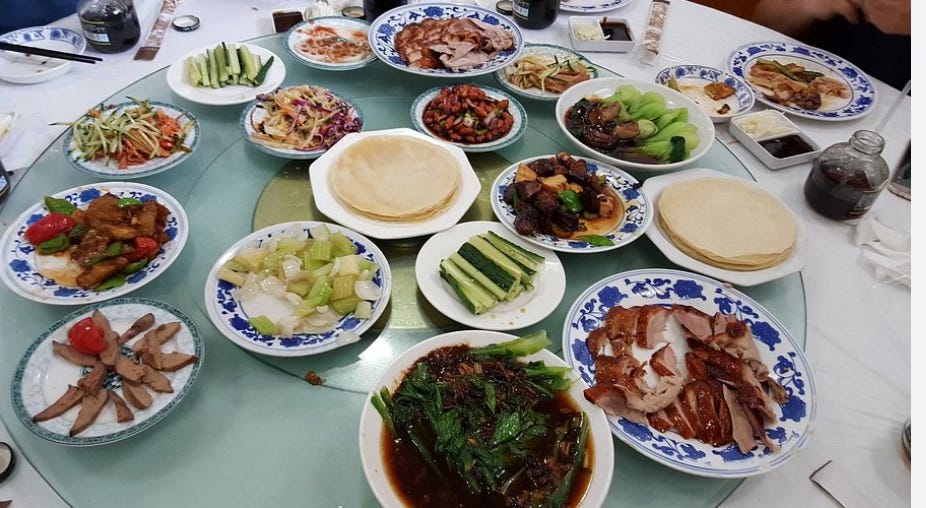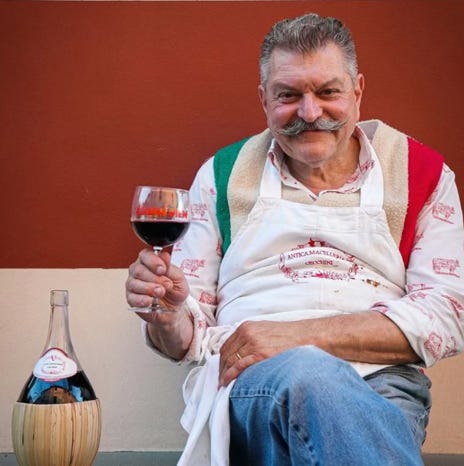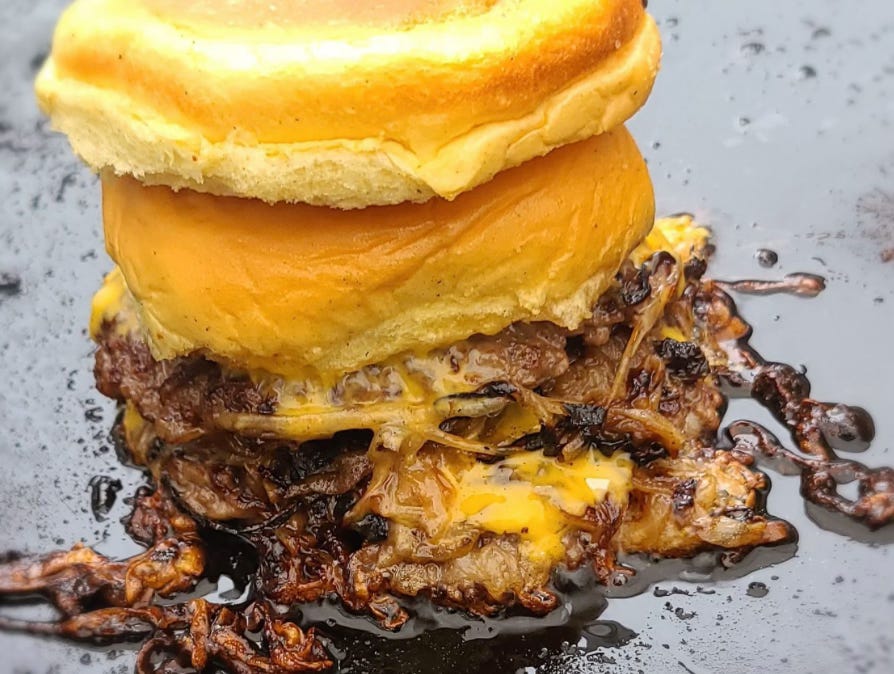When I was young, and discovered how thoroughly food could comfort me, I wanted it all the time. Some taut and bulbous teat to suckle joy from, hanging like an anchor around my neck.
We weren’t allowed “sugar cereal” at our house. At my first sleepover I discovered a pantry full of the stuff. My friend’s mom, a bit amused by my reaction, invited me to have as much Frosted Flakes as I’d like. I polished off the box.
Eating meant complete abandon from the trivialities of life. The smell and sight of it began the trickle of brain chemicals, but when the fat and salt from whatever greasy bag hit my tongue, it was a lights out emotionally charged experience.
You push that button long enough, and eventually, you’re just pushing it to maintain. The smell of hot french fries may titillate, the tang of mayo cut with pickles may yet arouse, but when it’s become your baseline, the only way to feel anything again is more. Always more.
I outgrew my own compulsions—insofar as I’d had enough mentally. The compulsions themselves stayed. But I wanted out. I needed out.
The cycle of diets began.
For years I took pleasure in food, without eating it. Show’s like Malto Mario and A Cook’s Tour gave me just enough connection to survive when I began dieting in earnest. I discovered books like Heat and Kitchen Confidential. I even started reading cook books—The Joy of Cooking and Mastering The Art Of French Cooking led me eventually to The River Cottage Meat Book, Modernist Cuisine, The Fifth Quarter: An Offal Cookbook and Apicus: Cookery and Dining in Imperial Rome—not for recipes, but for relief. For sanity, maybe. Or insanity, depending on your point of view.
One of my early diets—designed and marketed as the most minimal-effort program imaginable, tailored to the modern man with no time to spare—offered a cheat day. Sunday became a gauntlet of gluttony. I’d start the day off with an early brunch, then a meticulously planned midday meal, and close it out with an epic dinner. Suffice it to say, I lost no weight. Eventually, the cheat day had to become a cheat meal, but even then I was capable of doing such quantitative damage that no progress was made.
Before my decades-long dieting venture, when I got my emotional fix through food, I didn’t care all that much about what I was eating. Adequate doses of fat, salt, carbohydrates were available to me with sufficient ease. Load me up with burgers, pizza, fries, chicken nuggets, all the sauces, all the spreads, make it messy, make me hunch over and eat it like a pig in a trough.
There was no obsession, because it was always there, always available. Some of the hardest decisions I’d have to make were between Wendy’s and McDonalds.
Which of you beauties will best service me tonight?
Occasionally I’d even opt for the stale foil wrapped burgers at a convenience store. Their patties barely resembled meat, but at 3am, I could fill a plastic bag and skip the shame of more “respectable” establishments like Carl’s Jr.
When I briefly stopped eating altogether in 2002, my obsession with food exploded. I found myself unable to think about much else. After a 60-day liquid diet followed by strict adherence to The Blood Type Diet, my thoughts lingered on food like a spurned lover. Close, vivid, just out of touch.
I often felt like I was trying to get sober while serving drinks at a bar. My wife remarked on more than one occasion, “Every time your diet gets strict, we all get fat.” I didn’t just need to cook and physically interact with food, I had to watch people eat it too.
I used to wonder why cooking shows and food videos always end with someone taking a bite. But if I’m being totally honest, I know it’s because they’ve figured me out. I get off on it. My sickness needs to see the food enter someone’s mouth.
Round and round I went, diet and gluttony, the endless cycle. While dieting I devoured food content: cooking, reading, watching, anything to stay connected to food. When I was overeating, the need for perfection faded. Quantity numbed the urge for creativity.
Once, my wife had to go on a business trip to Beijing. I tagged along just to watch her eat. When she refused the duck at LiQun Roast Duck, I had to dig in, I couldn’t not. What followed was nothing short of hedonism: skewered scorpions flash-fried in oil, hot pot, dumplings, any and everything I could get my hands on. But by the end of the trip, I was opting for massive western room service spreads, alone.
The cheat meal seemed to always turn into the cheat month, or three.
I did eventually get some slight restrictions in place… KETO!
Keto was perfect for me, because you weren’t supposed to be able to overeat on keto. One of the major selling points of this diet was that I didn’t have to count calories or be hungry.
So I opted for meat centric Cheat Meals, but let’s be honest, was it even cheating?
I wasn’t losing weight, but damnit I wasn’t eating carbohydrates either!
At least my binge eating was evolving, it had parameters now.
I once dragged my wife and kids hours out into the Tuscan countryside to visit the iconic Italian butcher, Dario Cecchini. The kids moaned and bitched, but Brandy has always been up for an adventure.
A couple weeks prior we’d begun our European sojourn in London. This all to eat at Fergus Henderson’s, St John. His book Nose To Tail Eating: A Kind Of British Cooking was one of my favorites. I’d wanted to watch Brandy eat beef heart—she refused.
I hadn’t read any of Dario Cecchini’s books, but I knew of him in the same way that whispered legends gain renown. An eighth generation butcher in Chiani, he’d recite Dante while taking apart a side of beef in his small shop. And in 2001, when the EU banned selling beef on the bone from cows older than a year, he held a funeral for Bistecca.
We feasted on Bistecca Fiorentina on the shops rooftop. For me, it was glorious. Brandy and the kids hated it, the steak was too rare, and I believe my meat-sweats freaked them out.
My weight swings continued in violent peaks and valleys, perfectly mirroring my obsession with food. When I ate, it eventually deteriorated into a sort of manic feeding. And when I starved, my hunger led me to seek alternative connections to food.
I’ve had to draw up stricter parameters, boundaries that keep my life moving in a positive direction. I’d tried radical piety, and with a baseline of radical gluttony, the only thing left for me, was radical moderation. But I had to resist the urge to fill myself to the point of explosion.
Once I eventually cast off the shackles of fad dieting and was eating enough nutritious food so I wasn’t insane with hunger, the food noise quieted to a noticeable degree.
My intent was to seek no emotional pleasure from food. Not that it had to be bland and boring—a bit of salt or hot sauce is fine—but it should never be some overwhelming explosion of joy. My purpose with food, is that it should fuel my body.
But I still lacked something. When I “cheated,” it was an entirely selfish act. My wife didn’t care about roast duck, or undercooked steaks on a Tuscan rooftop. My children weren’t part of those equations either. I took some pleasure when they enjoyed what I cooked, but I was cooking for myself.
Piety brought with it a life of solitude. Food became a solemn act. it served nothing beyond fueling my body. The other extreme—wanton, debaucherous consumption—proved to be equally lonely. Even feeding others often served only as a rationalization to fill myself.
My daughters love to bake. There have been so many regretful, shattered moments where they wanted me to participate—or even just acknowledge—their creations, and I tried to remain pure. But really, it was just a form of absence.
And when I let my hair down, it was no better.
I had to find my way into the life I wanted. To be able to share moments with my family and friends, some of which were centered by food.
Occasionally I will decide to eat something delicious, even if it’s not strictly for fuel. But I will not eat to the point of euphoria, and I will not eat to emotionally comfort myself.
These days, I put a lot of thought into any meal that’s a departure from the norm. I might ruminate on a recipe for some weeks or months, research where to find fermented tea leaves for a Burmese salad, or play the age-old game of who sells the best pizza or burger in NYC—I believe it’s Joe’s and JG Melon, but the game goes on.
When I keep food mostly to a fuel source, the departures aren’t so radical. Recently Brandy and I tried a new burger spot in Greenwich Village. It had been all the rage on social media for months—smash burgers with gigantic heaps of paper-thin onions cooked into the patties. We went, we each got a burger and split an order of fries we didn’t finish.
To be honest, I didn’t love it. It had all the necessary fat and salt and grease for a great burger, but nothing special by way of flavor.
And that was that. I won’t have another burger for some months.
Food is fuel, but it can also be fun. I just have to keep that fun within a small window and recognize that if I let my guard down, the wheels might come off, and that’s not the life I want to lead.
Today my off-plan—in all honesty I’m simply not built for “cheating”—is as much about actually experiencing something joyful with my family and friends. Sharing a moment with them. I’m as much invested in their experience as I am my own, and the experience as a whole is much more important than whatever food is being served. I am now a present participant in the moment.
These moments are highly regulated for me, there’s a version of this where I’m rationalizing making every moment of life some joyous celebration—but I know that path leads to solitude for me.
My family loves to argue over who serves the best burger. In Los Angeles they seem to resoundingly favor In-N-Out, while I prefer Burgers Never Say Die. The game endures.
I’ve already started doing research for our next contender, we’ll be hitting the Red Hook Tavern this Fall… I’ll let you know.






This episode hit something deep for me. I’m not even sure “triggering” is the right word—it was more like a vivid reminder of the life I escaped, and just how grateful I am to not be living in that cycle anymore. So much of what you shared felt familiar. Same patterns. Same pain. Same hope that the next fix would finally be it.
What really stood out was the way you talked about bingeing after restriction. Have you ever looked into the Minnesota Starvation Experiment? It’s wild how closely the behaviors line up—men who never had food issues suddenly obsessing over recipes and cookbooks, reading them like love letters. Once they were “allowed” to eat again, they binged. It wasn’t just gluttony—it was biology. The study showed us that binge-restrict cycles aren’t solved by more control; they’re caused by deprivation.
I grew up in a home where food was tightly controlled. No junk. No cereal. So I get that experience you talked about with the Frosted Flakes. When you finally had access to it, it was like—Hello, beautiful. There’s this urgency that kicks in: I don’t know when I’ll get this again, so I better go all in now. It’s not just about the taste—it’s about scarcity, rebellion, and the dopamine rush. That’s psychological reactance. The more we’re told we can’t have something—even by our own rules—the more we want to prove we can. For me, that rebellion showed up in food. It was never about willpower. It was about autonomy.
So thank you—for going deep, for asking why, for peeling back layers most people don’t even realize are there. Every day used to be a cheat day for me. But now I’m learning just how different dopamine sensitivity is from person to person. I still eat donuts. I still enjoy food. But I don’t covet it anymore. I covet the experience. And honestly? The biggest dopamine hit was never from the food—it was from the anticipation. Learning how to work with that—how to ride the wave instead of being pulled under—is exactly where I am now.
Looking forward to your next introspective.
This is powerful, Ethan - thank you for your openness. For me, it started with a chaotic childhood fueled by my parents alcoholism and mental health issues. I learned that I could calm down - of course it was a dopamine reaction, but I didn’t understand this when I was five years old. I’d go through periods where I would try to be disciplined, but then when something traumatic happens, I got sucked into that cycle again. I think a lot of people can appreciate that these coping skills are there in many different forms - your writing about it here is truly strength through vulnerability. Thank you.